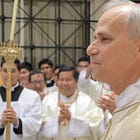Leo XIV affirms Vatican II's Catholic-Jewish dialogue on Day 1?
According to the American Jewish Committee, 'Leo XIV' reaffirmed Vatican II’s Jewish dialogue on the very day of his election. But is the published letter authentic?

According to the American Jewish Committee, 'Leo XIV' reaffirmed Vatican II’s Jewish dialogue on the very day of his election. But is the published letter authentic?
The American Jewish Committee, a civil rights and advocacy group, has posted a letter on Twitter, which they claim to be from Leo XIV, and which is dated 8 May 2025—the date of his election.
The letter reads:
To Rabbi Noam E. Marans
Director
Interreligious Affairs
American Jewish Committee (AJC)The Cardinals of the Holy Roman Church elected me as Bishop of Rome and Supreme Pastor of the Catholic Church.
I am pleased to inform you that the solemn inauguration of my pontificate will be celebrated in Saint Peter's square on 18 May 2025.
Trusting in the assistance of the Almighty, I pledge to continue and strengthen the Church's dialogue and cooperation with the Jewish people in the spirit of the Second Vatican Council's Declaration Nostra Aetate.
From the Vatican, 8 May 2025
Leo PP. XIV
Is it authentic?
At the time of writing, there was no sign of this letter on the Vatican website, but one would not necessarily expect such a letter, written to an individual group (presumably one of many) to appear there.
This tweet gives rise to several questions:
Is this letter authentic?
Is it believable that Leo XIV would spend his first evening as pope writing such a letter?
The letter is unsigned—was it already written by others, merely awaiting a name? If so, was Prevost even aware of it?
Was it written later, and backdated to the day of his election—as an indication of the importance of its contents?
The letter itself may be a reply to AJC and Rabbi Marans’ 8 May statement, congratulating Prevost on his election:
“We look forward to a close relationship with Pope Leo XIV as we continue to advance positive Catholic-Jewish relations for the benefit of Catholics, Jews, and all of humanity,” said Rabbi Noam Marans, AJC Director of Interreligious Affairs.
“In this sixtieth anniversary year of Nostra Aetate, when we celebrate and reflect upon the positive transformation of Catholic-Jewish relations, we stand ready to work with Pope Leo XIV to assure that past successes are affirmed and furthered and new challenges are met with confident collaboration.”
As we enter a new papal era, AJC remains committed to vibrant conversations and actions that secure and further Catholic-Jewish relations, redouble the fight against resurgent antisemitism, persecution of Christians and all forms of hate, and fulfill the promise of Holy See-Israel relations.
AJC has an office in Rome:
AJC's Rome office works with the Vatican to advance interreligious relations and cultivate a dialogue of trust and cooperation around our common commitment to countering antisemitism and all forms of bigotry.
AJC themselves said in response to the letter:
We are deeply moved that Pope Leo XIV, so early in his papacy, has reaffirmed his commitment to Catholic-Jewish relations. […]
As we approach the 60th anniversary of this landmark declaration, we look forward to working together to deepen understanding and cooperation.
All in all, it seems that the letter is authentic. It is also being treated as such by the press. The Jewish News Syndicate (JNS) spoke to Rabbi Marans, who told them:
“It is gratifying to see that, so early in his tenure, the pope has affirmed the importance of strong Catholic-Jewish relations,” Marans told JNS, adding that the letter was “unexpected but entirely welcome.”
“The pope recognizes that Nostra Aetate remains a call to action for stronger ties between the two faiths, and we stand ready to work with the Church to ensure that happens,” Marans added.
The National Catholic Register has also reported on the letter.
What does it mean?
In spite of this probable authenticity, the lingering questions above make it difficult to draw many conclusions—except that the general Vatican apparatus is still firmly ordered towards the religion of Vatican II.
Even if Prevost had nothing to do with this letter, he himself affirmed Vatican II on the second day of his regime:
In this regard, I would like us to renew together today our complete commitment to the path that the universal Church has now followed for decades in the wake of the Second Vatican Council.
Pope Francis masterfully and concretely set it forth in the Apostolic Exhortation Evangelii Gaudium, from which I would like to highlight several fundamental points: the return to the primacy of Christ in proclamation (cf. No. 11); the missionary conversion of the entire Christian community (cf. No. 9); growth in collegiality and synodality (cf. No. 33); attention to the sensus fidei (cf. Nos. 119-120), especially in its most authentic and inclusive forms, such as popular piety (cf. No. 123); loving care for the least and the rejected (cf. No. 53); courageous and trusting dialogue with the contemporary world in its various components and realities (cf. No. 84; Second Vatican Council, Pastoral Constitution Gaudium et Spes, 1-2).1
We will be considering the implications of this text on Vatican II in due course.
HELP KEEP THE WM REVIEW ONLINE WITH WM+!
As we expand The WM Review we would like to keep providing free articles for everyone.
Our work takes a lot of time and effort to produce. If you have benefitted from it please do consider supporting us financially.
A subscription gets you access to our exclusive WM+ material, and helps ensure that we can keep writing and sharing free material for all.
(We make our WM+ material freely available to clergy, priests and seminarians upon request. Please subscribe and reply to the email if this applies to you.)
Subscribe to WM+ now to make sure you always receive our material. Thank you!
Further reading:
Follow on Twitter, YouTube and Telegram:





